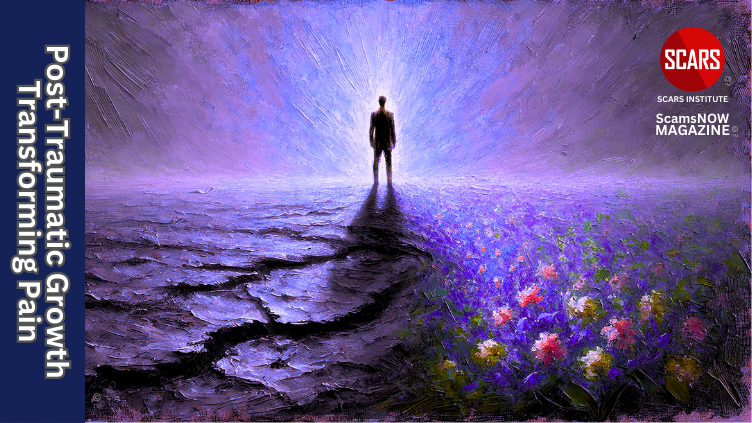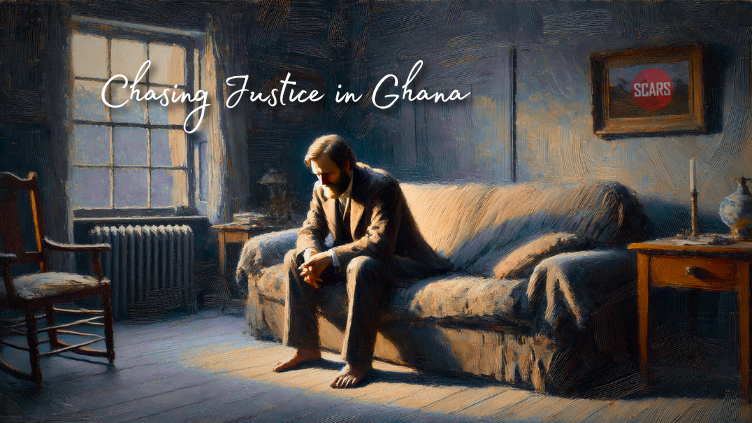Chasing Justice in Ghana – A Romance Scam Victim’s Story – A Short Story
A Romance Scam Story
A Short Story by Tim McGuinness, Ph.D., based on a real victim’s story.
I’m Jack, a 45-year-old mechanic from Columbus, Ohio, and I’m furious as I tell you how a romance scam turned my life into a nightmare. I thought I found love with a woman named Emily Carter, but she took $24,000 from me, led me on a wild chase to Ghana, and left me with nothing but regret. I’m still boiling with anger, my voice trembling as I recount every foolish step I took, every moment I believed her lies, and how I nearly lost my life trying to bring her to justice.
It all started on a dating app where I swiped right on Emily’s profile. Her photo showed a stunning white woman with long blonde hair and piercing blue eyes, the kind of beauty that stops you in your tracks. She claimed she was an American, a former adult video star who had left that life behind to care for her sick grandmother in Ghana. I messaged her, my heart racing with excitement, and she responded with a warmth that made me feel special. We chatted for weeks, our conversations growing more intimate as she shared stories about her life, her dreams, and her struggles in Ghana. I fell hard, my lonely nights as a single man replaced with the thrill of her messages, her promises of a future together.
Emily told me her grandmother needed medical care, and she asked for money to help cover the costs. I sent $5,000 without hesitation, my fingers clicking the transfer button as I imagined her gratitude. She thanked me profusely, calling me her hero, and I felt proud, like I was making a difference in her life. Over the next few months, her requests kept coming. She needed funds for rent, then for a visa to return to the U.S., and later for travel expenses. I sent more each time, $24,000 in total, my savings draining as I clung to the hope of meeting her in person, of building the life she promised we’d share.
I discovered the truth one evening while browsing online, my stomach twisting with dread as I stumbled upon a website featuring adult video stars. Emily’s photos stared back at me, credited to a woman named Danielle Delaunay, a completely different person. I realized with a sickening jolt that the images Emily sent me were stolen, that she had been using Danielle Delaunay’s identity to scam me. I confronted her through WhatsApp, my messages furious as I demanded an explanation, but she blocked me, her profile vanishing like she had never existed. I sat there, my fists clenched, my anger boiling over as I realized I had lost $24,000 to a lie.
I refused to let her get away with it. I booked a flight to Ghana, my jaw tight with determination as I packed my bags, vowing to find her and bring her to justice. I landed in Accra, the capital city, my eyes scanning the bustling streets as I stepped off the plane, the humid air hitting me like a wall. I checked into a small hotel, my room barely big enough for the single bed, and I started asking around about Emily Carter since that was the only name I had. I showed her photos to taxi drivers, market vendors, and hotel staff, my voice sharp with frustration as I described her, hoping someone would recognize her. Nobody did, their blank stares fueling my anger as I realized this wouldn’t be easy. All I had were the stolen photos.
I visited the local police station, my hands gripping the photos as I explained my situation, demanding they help me find her. They listened politely, their faces expressionless, but they offered no support, telling me they couldn’t assist without more evidence. I left the station, my blood boiling, feeling like the system had failed me just as Emily had. Determined not to give up, I hired a local investigator named Kwame Mensah, a man I found through a flyer at the hotel. I paid him $2,000 upfront, my wallet lighter as I handed over the cash, hoping his promises to track her down were real. He seemed confident, his smile reassuring as he took the photos and my story, but days turned into weeks with no results. I called him repeatedly, my voice rising with each unanswered message, until I realized he had scammed me too, disappearing with my money and leaving me with nothing but more rage.
I felt my hope slipping away, my anger turning to despair as I wandered the streets of Accra, my search leading nowhere. I questioned every decision I made, my mind replaying the moment I sent Emily that first $5,000, my heart aching with the realization that I had been so blind. I sat on the edge of my hotel bed one night, my fists clenched, tears burning my eyes as I admitted to myself that I might never find her. I felt like a fool, my journey to Ghana a reckless chase for justice that was costing me more than I ever imagined.
My desperation made me careless, and that’s when everything fell apart. I was walking back to my hotel one evening, my steps heavy with exhaustion, when a group of men approached me. They grabbed me, their hands rough as they pulled me into a van, my shouts for help swallowed by the noisy street. I found myself tied up in a dimly lit room, my heart pounding as they demanded $10,000 for my freedom. I pleaded with them, my voice cracking with fear, but they didn’t budge, their eyes cold as they told me I had one day to pay. I had no choice, my anger replaced by terror as I contacted my brother in Columbus, begging him to wire the money. He sent it, my last lifeline, and the kidnappers released me, leaving me on a deserted road outside the city, my body trembling as I stumbled toward safety.
I made my way to the U.S. embassy in Accra, my clothes dirty and my spirit broken, my anger now a dull ache in my chest. I explained my situation, my voice hoarse as I recounted the scam, the failed search, and the kidnapping, my hands shaking as I handed over my passport. The embassy staff helped me; their kindness was a stark contrast to the chaos I had endured, arranging for me to fly home to the U.S. I boarded the plane, my body slumped in the seat, my mind numb as I stared out the window, the reality of my journey sinking in.
I returned to Columbus a changed man, my savings gone, my pride shattered, and my heart heavy with regret. I lost $40,000 in total, $24,000 to Emily’s scam, and another $6,000 for the trip and the fake investigator, and $10,000 to the kidnappers, money I had worked years to save. I nearly lost my life chasing justice, my anger driving me to Ghana only to face more betrayal and danger. I sat in my small apartment, my hands clenched around a cup of coffee, my eyes staring at the wall as I realized the bitter truth. I should have accepted reality from the start, should have let go of my need for revenge, and saved myself the trouble. I thought I could find her, make her pay for what she did, but all I found was more pain, more loss, and a lesson I’ll never forget: some battles aren’t worth fighting, and some loves aren’t worth chasing. I gave up hope on that journey, but in the end, I learned to let go, to move forward with the pieces of my life that remained, vowing never to let my anger lead me into such darkness again.
Author’s Note: This is a work of fiction, but often in fiction we can see the deeper truth.
-/ 30 /-
What do you think about this?
Please share your thoughts in a comment below!
4 Comments
Leave A Comment
TABLE OF CONTENTS
CATEGORIES
![NavyLogo@4x-81[1] Chasing Justice in Ghana - A Romance Scam Victim's Story - A Short Story - 2025](https://scamsnow.com/wp-content/uploads/2025/04/NavyLogo@4x-811.png)
ARTICLE META
Important Information for New Scam Victims
- Please visit www.ScamVictimsSupport.org – a SCARS Website for New Scam Victims & Sextortion Victims.
- SCARS Institute now offers its free, safe, and private Scam Survivor’s Support Community at www.SCARScommunity.org – this is not on a social media platform, it is our own safe & secure platform created by the SCARS Institute especially for scam victims & survivors.
- SCARS Institute now offers a free recovery learning program at www.SCARSeducation.org.
- Please visit www.ScamPsychology.org – to more fully understand the psychological concepts involved in scams and scam victim recovery.
If you are looking for local trauma counselors, please visit counseling.AgainstScams.org
If you need to speak with someone now, you can dial 988 or find phone numbers for crisis hotlines all around the world here: www.opencounseling.com/suicide-hotlines
Statement About Victim Blaming
Some of our articles discuss various aspects of victims. This is both about better understanding victims (the science of victimology) and their behaviors and psychology. This helps us to educate victims/survivors about why these crimes happened and not to blame themselves, better develop recovery programs, and help victims avoid scams in the future. At times, this may sound like blaming the victim, but it does not blame scam victims; we are simply explaining the hows and whys of the experience victims have.
These articles, about the Psychology of Scams or Victim Psychology – meaning that all humans have psychological or cognitive characteristics in common that can either be exploited or work against us – help us all to understand the unique challenges victims face before, during, and after scams, fraud, or cybercrimes. These sometimes talk about some of the vulnerabilities the scammers exploit. Victims rarely have control of them or are even aware of them, until something like a scam happens, and then they can learn how their mind works and how to overcome these mechanisms.
Articles like these help victims and others understand these processes and how to help prevent them from being exploited again or to help them recover more easily by understanding their post-scam behaviors. Learn more about the Psychology of Scams at www.ScamPsychology.org
SCARS INSTITUTE RESOURCES:
If You Have Been Victimized By A Scam Or Cybercrime
♦ If you are a victim of scams, go to www.ScamVictimsSupport.org for real knowledge and help
♦ SCARS Institute now offers its free, safe, and private Scam Survivor’s Support Community at www.SCARScommunity.org/register – this is not on a social media platform, it is our own safe & secure platform created by the SCARS Institute especially for scam victims & survivors.
♦ Enroll in SCARS Scam Survivor’s School now at www.SCARSeducation.org
♦ To report criminals, visit https://reporting.AgainstScams.org – we will NEVER give your data to money recovery companies like some do!
♦ Follow us and find our podcasts, webinars, and helpful videos on YouTube: https://www.youtube.com/@RomancescamsNowcom
♦ Learn about the Psychology of Scams at www.ScamPsychology.org
♦ Dig deeper into the reality of scams, fraud, and cybercrime at www.ScamsNOW.com and www.RomanceScamsNOW.com
♦ Scam Survivor’s Stories: www.ScamSurvivorStories.org
♦ For Scam Victim Advocates visit www.ScamVictimsAdvocates.org
♦ See more scammer photos on www.ScammerPhotos.com
You can also find the SCARS Institute’s knowledge and information on Facebook, Instagram, X, LinkedIn, and TruthSocial
Psychology Disclaimer:
All articles about psychology and the human brain on this website are for information & education only
The information provided in this and other SCARS articles are intended for educational and self-help purposes only and should not be construed as a substitute for professional therapy or counseling.
Note about Mindfulness: Mindfulness practices have the potential to create psychological distress for some individuals. Please consult a mental health professional or experienced meditation instructor for guidance should you encounter difficulties.
While any self-help techniques outlined herein may be beneficial for scam victims seeking to recover from their experience and move towards recovery, it is important to consult with a qualified mental health professional before initiating any course of action. Each individual’s experience and needs are unique, and what works for one person may not be suitable for another.
Additionally, any approach may not be appropriate for individuals with certain pre-existing mental health conditions or trauma histories. It is advisable to seek guidance from a licensed therapist or counselor who can provide personalized support, guidance, and treatment tailored to your specific needs.
If you are experiencing significant distress or emotional difficulties related to a scam or other traumatic event, please consult your doctor or mental health provider for appropriate care and support.
Also read our SCARS Institute Statement about Professional Care for Scam Victims – click here
If you are in crisis, feeling desperate, or in despair, please call 988 or your local crisis hotline – international numbers here.
More ScamsNOW.com Articles
A Question of Trust
At the SCARS Institute, we invite you to do your own research on the topics we speak about and publish. Our team investigates the subject being discussed, especially when it comes to understanding the scam victims-survivors’ experience. You can do Google searches, but in many cases, you will have to wade through scientific papers and studies. However, remember that biases and perspectives matter and influence the outcome. Regardless, we encourage you to explore these topics as thoroughly as you can for your own awareness.

























![scars-institute[1] Chasing Justice in Ghana - A Romance Scam Victim's Story - A Short Story - 2025](https://scamsnow.com/wp-content/uploads/2025/04/scars-institute1.png)

![niprc1.png1_-150×1501-1[1] Chasing Justice in Ghana - A Romance Scam Victim's Story - A Short Story - 2025](https://scamsnow.com/wp-content/uploads/2025/04/niprc1.png1_-150x1501-11.webp)
This is indeed sad, that’s how it works in every scam cases, each has its own story to tell, only remembering the wounds it inflicted on our lives.
We as victims only knows how and when it happens… Stories left behind us, to recall those terrible mistakes we’ve made.
SCARS can never be diminished from our devastated experiences but life goes on….
Healings can only takes place after we accepted being scammed and letting it go.
I sympathise with every victims concerned, as I felt how you feel about it.
Although “made up”, it’s certainly a story that is happening around the world every day. Thankfully most “victims” do not go to the lengths his man did and don’t fly across the pond for vengence, but stalking, anger, and finally despair will ruin the possibility of a fulfilling life. Beware and Be Aware…if you’re a victim to a financial crime like this, you’re not alone. It wasn’t your fault. You are a SURVIVOR – look for assistance through SCARS.
There is a very important message from this story:
after discovering a scam, never in any way try to seek justice on your own /do not confront the scammer, do not attempt a personal contract with the scammer by going to the” alleged” country of his origin/
Taking such steps not only will not meet your expectations, but may even end tragically for you.
Turn the scammer over to law enforcement – report the scam and focus on yourself, on your healing process.
La cruda realidad cuando has sido víctima de estafa, lamentablemente esta es una historia que han vivido muchas personas tristemente algunas han perdido la vida. Es muy difícil darse cuenta de que fuiste engañado y utilizado que fuiste estafado con la única intención de quitarte tu dinero sin importar el daño que causan.
Pero como bien dice al final de la historia por muy difícil que es hay que aceptarlo el buscar venganza lo único que provoca es dañarnos a nosotros mismos aún más de lo que ya hemos sido dañados.